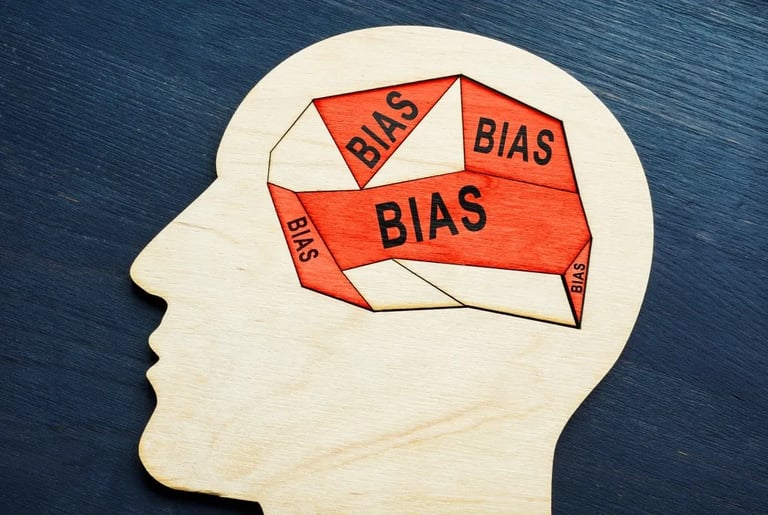Cognitive Bias: Decoding Your Mind and Unlocking Self-Awareness
Discover how Cognitive Bias shapes decisions, relationships, and self-perception. Decoding your mind, overcoming hidden biases, and unlocking lasting personal growth.
9/9/20253 min read


Cognitive Biases: Decoding your Mind
Introduction
Human thinking is not as rational as we like to believe. According to Freud, the Pleasure Principle — our instinct to seek pleasure and avoid pain — drives most of our thoughts and actions. This same principle is the root of our Cognitive biases, the subtle distortions that influence how we perceive reality, make decisions, and interact with others.
Understanding these Cognitive biases in psychology helps us identify patterns that cloud judgment, weaken self-awareness, and affect relationships.
What Are Cognitive Biases?
Definition: Cognitive biases are systematic distortions in thinking caused by emotional drives, social pressures, and unconscious motivations.
Connection to the Pleasure Principle: We unconsciously prefer thoughts and beliefs that bring comfort, validation, or a sense of belonging — even if they aren’t true.
Impact: From everyday decision-making to major life choices, biases shape how we interpret information and interact with the world.
Common Mental Biases Explained
1. Confirmation Bias
We naturally search for evidence that supports our beliefs and ignore evidence that challenges them.
Example: Reading only news sources that match your political views.
2. Conviction Bias
If we defend an idea passionately, we convince ourselves it must be true. Even when doubts exist, the act of defending makes us dig deeper into false confidence.
Example: Arguing online for hours about a belief you’re not fully sure of — just to “win” the debate.
3. Appearance Bias (Halo Effect)
We judge people by appearances. If someone looks attractive or confident, we assume they have other positive qualities. The reverse happens with negative appearances.
Example: Believing a well-dressed speaker is more intelligent than someone in casual clothes.
4. Group Bias (Groupthink)
We feel comfort when others think like us. Belonging gives us security, while isolation feels painful — so we adopt group ideas, even if they’re flawed.
Example: Agreeing with your team’s bad idea just to avoid conflict.
5. Blame Bias
It’s easier to point fingers than to self-reflect. We instinctively blame others to avoid the pain of confronting our own mistakes.
Example: Blaming your boss for poor results instead of acknowledging your lack of preparation.
6. Superiority Bias
We all want to see ourselves as ethical, rational, and likable — but this self-image isn’t always true. If it were, humanity would live in perfect harmony.
Example: Thinking “I’m less biased than most people,” which ironically is a bias itself.
Overcoming Cognitive Biases and Unlocking Personal Growth
Awareness of cognitive biases is the first step — but awareness alone isn’t enough. To truly grow, we must train our minds to question automatic patterns and reframe distorted thinking.
Practical Ways to Overcome Biases
Practice Self-Reflection → Notice when your thoughts feel emotionally charged. Ask: Am I seeing facts, or am I protecting my comfort?
Seek Diverse Perspectives → Talk to people outside your bubble. Exposure to new ideas reduces confirmation and group bias.
Slow Down Decisions → Many biases arise from quick judgments. Pausing gives your rational mind space to engage.
Challenge Assumptions → Write down your beliefs and ask: What evidence supports this? What evidence challenges it?
Cultivate Emotional Awareness → Recognize when fear, pride, or desire for approval is guiding your thinking instead of logic.
Growth Through Awareness
When we learn to recognize and regulate our cognitive biases, we:
Build clearer self-awareness
Make better decisions in personal and professional life
Strengthen empathy and relationships
Unlock the path to personal growth and emotional intelligence
Cognitive biases aren’t flaws to eliminate — they are opportunities. By decoding and working with them, we transform the hidden patterns of our mind into tools for self-improvement.
Why Cognitive Biases Matter in Daily Life
In professional life: They distort hiring, leadership, and teamwork.
In relationships: They cause misunderstandings and false assumptions.
In personal growth: They block honest self-reflection.
In society: They fuel stereotypes, conflicts, and mass movements.
Conclusion
Cognitive biases show how the pleasure principle shapes our thoughts, often leading us toward comfort instead of truth. By learning to recognize and question our biases, we gain clarity, improve decisions, and develop healthier relationships with ourselves and others.

